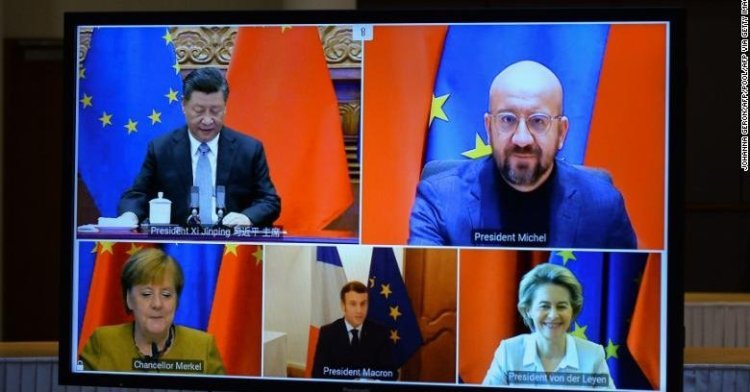Since Joe Biden was announced President-elect in November, Chinese negotiators have gone into overdrive to make the CAI happen before his inauguration. For all of President Trump’s tough talk on China, the mere idea of the Biden Presidency and his potential to rally allies against this type of deal seems to have had more substantial impacts. China’s negotiators have conceded considerably on market accesses for EU companies, even removing the technology transfer requirements and laid down obligations for the heavily subsidized state-owned enterprises, in hopes to push CAI through before the end of the year. Chinese President Xi Jinping even involved himself personally in the negotiations. Despite requests from Biden’s incoming administration to discuss the matter and wait on the deal, the agreement has successfully been made.
Considering Biden’s noted goal of fixing transatlantic relations and working alongside the EU to manage relations with China, CAI is – arguably – a bit of an affront to the U.S. President-elect. However, EU leaders have emphasized that the deal is bilateral and is not against America. As many in expert and policy communities have also repeatedly called for and emphasized the advantage of a joint U.S.-EU approach to Beijing, CAI could also preempt such coordination. This is not surprising, given that the last four years of U.S. policy towards Europe has created growing anti-American sentiment on the continent. Nonetheless CAI is a bit of a blow for transatlanticism and those who hope that the incoming administration can mend the EU-U.S. relationship, or at least work together to contain China. Many U.S. leaders seem rather stunned that CAI is in fact being concluded on the eve of a new U.S. administration.
Although many U.S. media outlets are shaming the EU for snubbing Biden and possibly jeopardizing the transatlantic relationship with the investment agreement while it continues to stand out against China rhetorically, CAI is nothing the United States can look down at the EU for. After all, Washington has repeatedly placed economic gain over human rights records, especially when it comes to China. Even earlier this year when a trade deal looked likely human rights were sidelined. Moreover, in the face of the economic devastation caused by the COVID-19 pandemic, its unsurprising that such a landmark investment agreement was finally negotiated between the EU and China. Moreover, European leaders compare CAI to the “Phase 1” trade deal already in play between China and the United States. Notably, regarding investment, it is “the most ambitious agreement that China has ever concluded with a third country”.
Within the Bloc, the main push to conclude CAI negotiations was led by German Chancellor Angela Merkel and has been completed under Germany’s six month rotating presidency of the EU. Germany is already China’s largest partner within the EU and as an outgoing leader, the historic agreement seals Merkel’s legacy.
Many others have outstanding concerns regarding human rights. In fact, a few weeks ago the EU Parliament passed a resolution condemning the forced labor of Muslim minority groups in China and denouncing “the fact that well-known European brands and companies have been benefiting from forced Chinese labor." CAI would enhance rather than counter these existing issues. Other concerns relate to abilities to counter China as the world’s single largest trading block becomes further entangled in the Chinese economy.
Although it is true the deal includes commitments from China to "work towards" ratifying International Labor Organization conventions, including those against forced labor, there are no concrete commitments. Furthermore, critics are concerned that, having made the deal, the EU will not be in a strong position to stop these practices. According to the EU however, CAI does ensure “the conditions of market access for EU companies clear and independent of China’s internal policies [and] allows the EU to resort to the dispute resolution mechanism in CAI in case of breach of commitments.”
The negotiations were concluded by EU leaders Ursula von der Leyen and Charles Michel – joined by German Chancellor Merkel and French President Macron – and Chinese President Jinping. However, months of discussion and debate in the EU Parliament lie ahead before it will go into effect.
In China, the agreement has been welcomed and celebrated, saying CAI is "a New Year gift from China and the EU to the whole world". After a year of their reputation deteriorating, the agreement marks a massive diplomatic victory. China’s Ministry of Commerce spokesperson has already emphasized hopes that the EU’s cooperation will help promote and solidify similar agreements with other countries and possibly even help restore normality with the United States.
Nevertheless, as it stands China is preparing for a Biden administration that will not work with them. This fall Beijing joined with 14 other nations under the Regional Comprehensive Economic Partnership, which is notably the largest trade pact in history. Contrastingly, the counter pact, the U.S. negotiated Trans-Pacific Partnership (TPP) excluding China was ran into the ground by the Trump administration back in 2017.
Whereas the handling of the TPP was clearly insightful regarding policy towards China during the Trump administration, only time will tell if the conduct regarding the CAI will be similarly predicative of EU-US relations on policy towards China for the Biden administration. Debates in the EU Parliament and early meetings with the Biden administration post-inauguration will hopefully provide better insight.

Follow the comments: |
|
